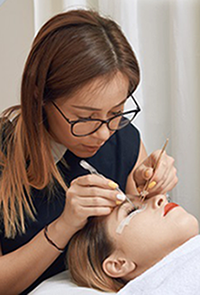An official website of the United States government
 United States Department of Labor
United States Department of Labor
| April 2018
We shape our personal style, in part, through the choices we make with our physical appearance. And when it comes to creating our own look, many of us turn to personal appearance workers.
Whether they give us a new hair color or cut, a manicure or pedicure, or a facial or other skincare treatment, these workers provide services for improving or maintaining our appearance.
Barbers cut, trim, shampoo, and style hair, mostly for male clients. They also may fit hairpieces, perform facials, and offer facial shaving.
Hairstylists offer a wide range of hair services, such as shampooing, cutting, coloring, and styling. They often advise clients, both male and female, on how to care for their hair at home.

Cosmetologists provide scalp and facial treatments and makeup services. Some also clean and style wigs and hairpieces.
Manicurists and pedicurists work on hands and feet, grooming fingernails and toenails. Treatment typically involves soaking the hands or feet to soften skin.
Skincare specialists, or estheticians, give facials, full-body treatments, and head and neck massages to improve the health and appearance of the skin. Some provide other treatments—such as peels, masks, and scrubs—to remove dead or dry skin.
Most personal appearance workers are employed in the personal care services industry, which includes barbershops, beauty salons, and nail salons. Workers also may bring their services directly to a client’s home, office, or special event. Some workers provide services “on wheels”: in a truck or a van that is equipped to operate like a salon.
Personal appearance services are expected to be in demand among both women and men seeking to enhance their lifestyles through necessary grooming. Some clients view services such as manicures and pedicures not as luxuries but as essential to success or wellness.
As table 1 shows, employment in each of these personal appearance worker occupations is projected to grow at least 13 percent from 2016 to 2026. That’s faster than the average of 7 percent for all occupations over the decade. BLS projects 115,600 annual openings, on average, to arise from this growth and from the need to replace workers who retire or leave these occupations for other reasons.
The table also shows that these occupations had high rates of self-employment in 2016—including nearly 75 percent of barbers. The rates of self-employment for the other occupations in the table were at least quadruple the 6-percent average for all occupations.
Wages in these occupations were lower than the median wage of $37,690 for all occupations in 2017. However, wages shown in the table exclude self-employed workers.
To enter these occupations, personal appearance workers typically need a certificate or some other postsecondary nondegree award from a state-approved program.
State licensure varies by occupation. For example, all states require barbers, hairstylists, and cosmetologists to be licensed; all states but Connecticut require licenses for manicurists and pedicurists; and licensure varies by state for skincare specialists.
Explore personal appearance worker occupations and hundreds of other occupations in the Occupational Outlook Handbook.
You can find more employment and wage data, including data by state and local area and by industry, for personal appearance occupations from the Occupational Employment Statistics program.
Other articles from Career Outlook that may be helpful include:
Patricia Tate, "Focusing on style: Careers in personal appearance," Career Outlook, U.S. Bureau of Labor Statistics, April 2018.